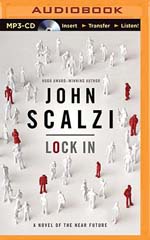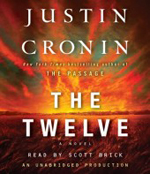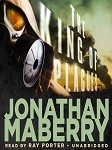
 Lock In
Lock In
By John Scalzi; Narrated by Wil Wheaton
Publisher: Brilliance Audio
Publication Date:
[UNABRIDGED] – 10 hours
Themes: / virus / near future / body swapping /
Publisher summary:
A blazingly inventive near-future thriller from the bestselling, Hugo Award-winning John Scalzi Not too long from today, a new, highly contagious virus makes its way across the globe. Most who get sick experience nothing worse than flu, fever, and headaches. But for the unlucky one percent—and nearly five million souls in the United States alone—the disease causes ‘Lock In:’ Victims fully awake and aware, but unable to move or respond to stimulus. The disease affects young, old, rich, poor, people of every color and creed. The world changes to meet the challenge. A quarter of a century later, in a world shaped by what’s now known as ‘Haden’s syndrome,’ rookie FBI agent Chris Shane is paired with veteran agent Leslie Vann. The two of them are assigned what appears to be a Haden-related murder at the Watergate Hotel, with a suspect who is an ‘integrator’—someone who can let the locked in borrow their bodies for a time. If the Integrator was carrying a Haden client, then naming the suspect for the murder becomes that much more complicated. But ‘complicated’ doesn’t begin to describe it. As Shane and Vann began to unravel the threads of the murder, it becomes clear that the real mystery—and the real crime—is bigger than anyone could have imagined.
Lock In is a solid book that has some good action, a bit of mystery, and a solid dose of politics thrown in. The story moves at a rapid pace and Scalzi clearly put some thought into the implications of the world he created. Some of the technology and mysteries that come as revelations are a bit obvious but the story is still a lot of fun. Scalzi also includes a short story (which was also released for free online) that explores the back story leading up to this book. I read that story before this one but I don’t think it would make a big difference reading it before or after since Scalzi explains what’s going on really well. I hope he writes more stories in this world.
The general premise is that a disease/virus spreads wildly and leaves a decent portion of the population “locked in”. Those that are “locked in” are completely aware of everything but can’t move, not even to blink their eyes. People affected by this condition are commonly referred to as “Haydens”. Technology has come up with a solution to this problem by implanting neural networks in the minds of Haydens that allow them to live a virtual life or live through a Threep, a robot they control (yes that name comes from C-3P0 of Star Wars). Everything was built up with the help of government funding but those funds are being cut now and haydens aren’t happy. We start the story following Chris, a rather famous hayden, on his/her first day working for the FBI.
With the change in government funding, there are lots of politics at work in the story. People want to cure the disease to free the people trapped in their bodies but some haydens insist they don’t need a cure. Non-haydens think they’re at a disadvantage to people who can do the same work without physically doing it themselves. Haydens are mad about cuts to public funding that will make it hard for them to get by. Companies are working all different angles to turn a profit. A lot of it is interested, some of it is a little too close to current political events and agendas that it might bother people who read to get away from stuff like that.
The story is structured almost like a mystery in that bad things are happening and they don’t totally make sense. The main character is investigating what’s going on as more and more details are revealed along the way. I thought a number of those revelations were obvious from the beginning and making them revelations instead of common knowledge in that world is a bit contrived, but that might just be because I’m a software engineer. In any case, just think of it like watching a Die Hard movie – go along for the ride, suspend belief a bit, and enjoy yourself.
As for the audio side of things, Wil Wheaton did a great job as usual. I haven’t encountered a book read by him that I didn’t like and hearing he narrated something automatically makes me more interested in giving something a try. The gender of the main character is never actually revealed so there are two audiobook versions featuring a male or female reader. That makes no difference in the story whatsoever so just pick a reader you like and go with it. If you didn’t hear that the gender wasn’t mentioned, you’d just as soon assume Chris to be the gender of the narrator.
Posted by Tom Schreck

